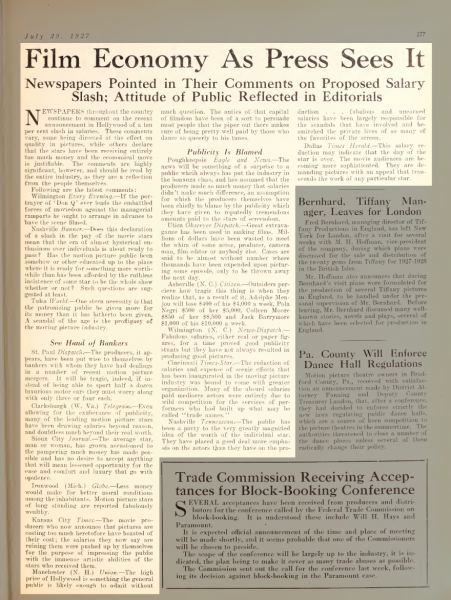| Artifact Type | Sources, Trade Journals |
| Publication | Motion Picture News |
| Volume | XXXVI |
| Number | 3 |
| Page Number | 277 |
| Place | New York |
| Publication Date | July 29, 1927 |
| Transcript | Show/Hide |
|
Headline: “Film Economy As Press Sees It” Subhead: Newspapers Pointed in Their Comments on Proposed Salary Slash; Attitude of Public Reflected in Editorials Newspapers throughout the country continue to comment on the recent announcement in Hollywood of a ten per cent slash in salaries. These comments vary, some being’ directed at the effect on quality in pictures, while othei’s declare that the stars have been receiving entirely too much money and the economical move is justifiable. The comments are highly significant, however, and should be read by the entire industry, as they are a reflection from the people themselves. Following are the latest comments: Wilmington Every Evening.—If the portrayer of ‘Don Q’ ever leads the embattled forces of moviedom against the managerial ramparts he ought to arrange in advance to bave the scene filmed. Nashville Banner.—Does this declaration of a slash in the pay of the movie stars mean that the era of almost hysterical enthusiasm over individuals is about ready to pass? Has the motion picture public been somehow or other educated up to the place where it is ready for something more worthwhile than has been afforded by the ruthless insistence of some star to be the whole show whether or not? Such questions are suggested at least. Tulsa World.—One stern necessity is that the patronizing public be given more for its money than it has hithei-to been given. A scandal of the age is the profligacy of the moving picture industry. See Hand of Bankers St. Paul Dispatch.—The producers, it appears, have been put wise to themselves by bankers with whom they have had dealings in a nimiber of recent motion picture mergers. It wall be tragic, indeed, if instead of being able to sport half a dozen luxurious motor cars they must worry along with only three or four each. Clarksburgh (W. Va.) Telegram.—Even allowing for the exuberance of publicity, many of the leading motion picture stars have been drawing salaries beyond reason, and doubtless much beyond their real worth. Sioux City Journal.—The average star, man or woman, has grown accustomed to the pampering much money has made possible and has no desire to accept anything that will mean lessened opportunity for the ease and comfort and luxury that go with opulence. Ironwood (Mich.) Globe.—Less money would make for better moral conditions among the inhabitants. Motion picture stars of long standing are reported fabulously wealthy. Kansas City Times.—The movie producers who now announce that pictures are costing too much heretofore have boasted of their cost; the salaries they now say are ruining them were pushed up by themselves for the purpose of impressing the public with the inunense artistic abilities of the stars who received them. Manchester (N. H.) Union.—The high price of Hollywood is something the general public is likely enough to admit without much question. The antics of that capital of filmdom have been of a sort to persuade most people that the piper out there miakes sure of being pretty well paid by those who dance so queerly to his tunes. Publicity Is Blamed Poughkeepsie Eagle and News.—The news will be something of a surprise to a public whcih always has put the industry in the bonanza class, and has assumed that the producers made so much money that salaries didn’t make much difference, an assumption for which the producers themselves have been chiefly to blame by the publicity which they have given to reputedly tremendous amounts paid to the stars of screendom. Utiea Observer Dispatch.—Great extravagance has been used in making films. Millions of dollars have been wasted to meet the whim of some actor, producer, camera man, film editor or anybody else. Cases are said to be almost without number where thousands have been expended upon pictur- ing some episode, only to be thrown away the next day. Asheville (N. C.) Citizen.—Outsiders per- cieve how tragic this thing is when they realize that, as a result of it, Adolphe Men- jou will lose $400 of his ,$4,000 a week, Pola Negri $500 of her $5,000, Colleen Moore $850 of her $8,500 and Jack Barrymore $1,000 of his $10,000 a week. Wilmington (N. C.) News-Dispatch.—Fabulous salaries, either real or paper fig- ures, for a time proved good publicity stunts but they have not always resulted in producing good pictures. Cincinnati Times-Star.—The reduction of salaries and expense of scenic effects that has been inaugurated in the moving picture industry was bound to come with greater organization. Many of the absurd salaries paid mediocre actors were entirely due to wild competition for the services of per- formers who had built up what May be called “trade names.” Nashville Tennessean.—The public has been a party to the very greatly magnified idea of the worth of the individual star. They have placed a good deal more emphasis on the actors than they have on the production … . fabulous and unearned salaries have been largely responsible for the scandals that have involved and besmirched the private lives of so many of the favorites of the screen. Dallas Times Herald.—This salary reduction may indicate that the day of the star is over. The movie audiences are becoming more sophisticated. They are demanding pictures with an appeal that transcends the work of any particular star. |
|
| Archive | The Internet Archive |
| Read In Context | https://archive.org/stream/motion36moti#page/277/mode/2up |
| Citation | “Film Economy As Press Sees It,” Motion Picture News, July 29, 1927. |
| Tags | 1920sJuly 1927 |
